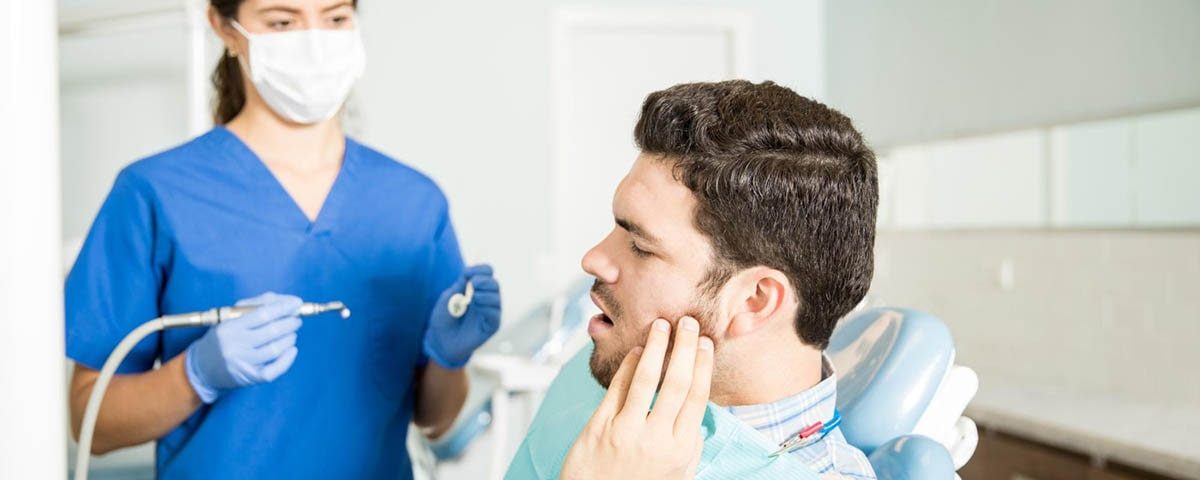
After Tooth Extraction, When Can You Smoke?
June 12, 2025
Can a Toothache Cause a Headache?
June 19, 2025Tooth pain can take over your whole day. It can make eating, sleeping, and talking feel difficult. Many people try to find out how to stop a toothache because the pain feels too strong to handle. This guide explains simple steps you can try at home and also tells you when to visit a dentist to stop the pain for good.
Table of Contents
ToggleHow to Stop a Toothache at Home?
Home steps may ease your pain for a short time. These do not fix the root cause, but they can make the pain more bearable. Use these tips while you plan your dental visit.
Saltwater rinse
Saltwater can clean the mouth and reduce swelling. Mix a cup of warm water with half a teaspoon of salt. Swish the mix gently, then spit it out. It can help flush out bacteria and calm sore gums. It is one of the first steps to try when you wonder how to stop a toothache in Avondale.
Cold compress
Cold help numb the pain and reduce swelling. Wrap ice in a clean towel and press it against your cheek near the sore area. Keep it on for 15 to 20 minutes. Repeat after short breaks. Cold is a simple step many people try when thinking about how to stop a toothache at home.
Clove oil
Clove oil has a natural numbing chemical called eugenol. Place one drop of oil on a cotton ball. Press it on the sore tooth gently. The oil may reduce pain for a short time.
Pain relievers
Over-the-counter pills like ibuprofen or acetaminophen can reduce pain and swelling. Always follow the instructions on the bottle. These medicines help control symptoms but do not fix the reason for the pain.
Peppermint tea
Peppermint can calm the area and reduce pain. Steep a tea bag in hot water. Let it cool, then place it on the sore tooth. The coolness and mint may ease the ache.
Toothache plant
The toothache plant creates a tingling or numbing feeling in the mouth. You can chew a leaf or place it near the sore spot. It may not be easy to find, but some health stores sell it. People often use it in natural healing for short-term help.
Garlic
Garlic fights bacteria. Crush a garlic clove to make a paste. Place it on the sore tooth. Some people also chew it. The taste is strong, but it may lower pain and swelling. Garlic remains a trusted home method when people explore how to stop a toothache with natural tools.
How Do Dentists Stop Toothaches?
Emergency dentists in Avondale use different treatments based on what is causing the toothache. Each treatment works in a different way to stop pain and fix the problem. Here’s what dentists do and how each treatment helps:
| Treatment | How It Helps |
| Filling | Seals a cavity to stop pain from tooth decay |
| Crown | Covers and protects a damaged tooth to stop pain from pressure |
| Root Canal | Removes the infected nerve that causes deep, steady pain |
| Tooth Removal | Takes out a tooth that causes severe pain and cannot be saved |
| Antibiotics | Reduces infection that causes swelling and throbbing pain |
When Should I See a Dentist to Stop Toothache?
You should go to the dentist when the pain does not go away after two days. Some signs mean you need care right away. If you wait too long, the pain can get worse. A dentist Avondale knows how to stop a toothache by fixing the real problem. Look for these signs:
- Tooth pain lasts more than 2 days
- Your face or jaw looks swollen
- You have a fever with a toothache
- It hurts to swallow or open your mouth
- You feel a sharp pain when you bite down
- The pain goes away, but keeps coming back
FAQs
How do you sleep with tooth pain?
Use a cold pack, take pain relief medicine, and sleep with your head raised. This helps lower blood flow to the area and may ease pain.
Can a toothache go away without treatment?
A mild toothache may go away on its own, but most need treatment to stop the pain.
Why does my toothache not go away with painkillers?
Painkillers only block pain. They do not fix the infection, crack, or decay causing it.
Does a throbbing tooth mean infection?
A steady throbbing pain often points to infection inside the tooth or gum.
When is a toothache an emergency?
If you have fever, swelling, or trouble breathing or swallowing, get care right away. These signs show a serious infection.





